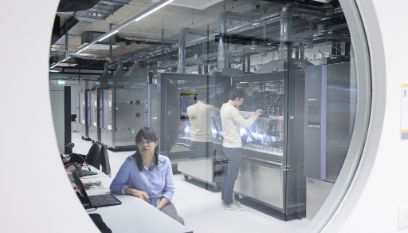Goal by 2023
Sustainability is an integral part of internal quality assurance in applied research.

Sustainability is an integral part of internal quality assurance in applied research.
Research at BFH has a direct impact on its innovative strength. The better the quality of research, the greater the progress in knowledge and thus the influence. The research results are often directly implemented and taken further by the practice partners, so that BFH research has an immediate impact and leads to more resource-efficient, energy-saving and/or socially responsible processes and products.
High-quality research motivates and drives the researchers at BFH. However, it is also characterised by active participation in the research community and in international mobility, and it is also very resource-intensive in certain research areas such as construction or technology. This leads to negative impacts primarily on the environment. Research outcomes of BFH could also be used by practice partners for non-sustainable activities (with or without the knowledge of BFH).
Currently, BFH has more than 55 research areas, the majority of which have a clear connection to sustainability.
In 2021, BFH maintained a total of 981 project partnerships (compared to 1,156 in the previous year) and reported third-party funding of CHF 41.9 million (compared to CHF 39.8 million in the previous year). With 360 research partnerships in the canton of Bern, it is an important driver of innovation and development in the canton and beyond.
The departments are basically responsible for quality assurance in research. The Research Commission and the Office of the Vice-President Research ensure the quality of interdepartmental research, for example by means of various advisory activities, specialised dossiers (e.g. digitalisation, internationalisation) and differentiated funding instruments, including the launch of so-called, Calls for Projects (CfP). The corresponding applications are evaluated through an open peer review process. There are public reports on the results.
It is important to BFH to communicate its expectations of good scientific practice to researchers and society. Corresponding guidelines have been drawn up in consultation with other Swiss universities and with the Swiss Academies of Arts and Sciences.
In order to ensure the quality of BFH research and its continuous development, there are various internal advisory and continuing education programmes, such as the modular continuing education programme in applied research. In addition, BFH also offers department-specific continuing education.
The intellectual property policy, directives on knowledge and technology transfer (KTT) and coordinated contract templates regulate KTT and ensure the exploitation of research results. In addition, each department has a KTT contact point for industry partners. Practice-oriented developments, communication with industry and with the specialist community, the linking of teaching and research, and the training and further education of its students and staff guarantee KTT.
The high quality of BFH research and the effectiveness of the quality assurance system are directly reflected in project acquisition as well as in a volume of third-party funding that has risen continuously over the last few years. In addition, BFH has a quantitative monitoring system based on sixteen quality indicators, such as the amount of third-party funding, the number of specialist publications, transfer in teaching and partnerships with industry.